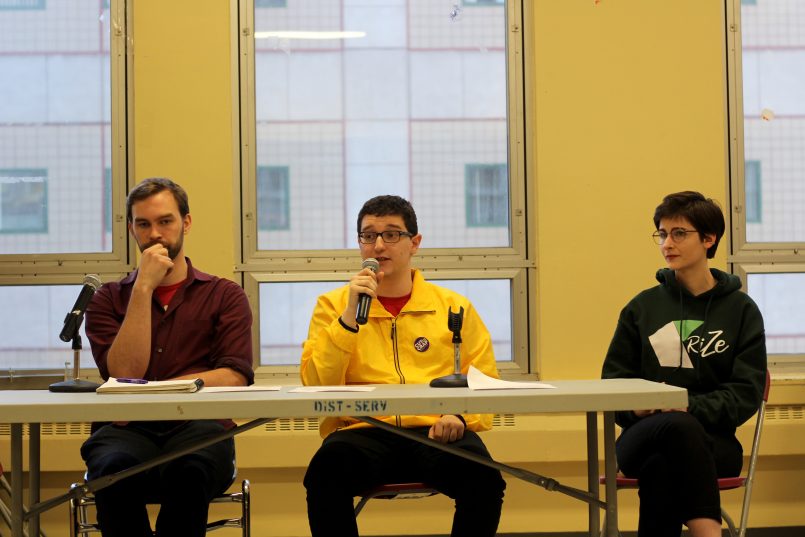The Concordia Student Union (CSU) held a meeting on March 1 for the potential impeachment of the General Coordinator, Christopher Kalafatidis.
The motion was brought forward by 10 CSU council members: Elizabeth Tasong, Hannah Jamet-Lange, Christiane Sakr, Naomi Barney Purdie, Esther Morand, Jarrad Haas, Maha Siddiqui, Leigh Kusaj, Victoria Pesce, and Lauren Perozek.
They claim that Kalafatidis has failed to address his mandate, by not appointing a Sustainability Coordinator, failing to have student representation on the Standing Committee on Sexual Misconduct and Sexual Violence, and not fulfilling his duties as chair on the Judicial Board, Sexual Violence Accountability Committee and the University Senate.
The members also claimed that Kalafatidis has ignored mandates given to him by council, which has affected the creation of Recovery and Wellness Centre (RAWCC)–a peer support group for people living with addiction.
“I was shocked to hear about this impeachment,” said Kalafatidis, who explained he wished people had given him a warning or asked for corrective behaviour before moving to impeachment. “It’s coming up for things that happened months ago and no one came to talk to me.”
On the issue of the Sustainability Coordinator failing to be appointed, Kalafatidis said that according to the CSU bylaws, it is up to the General Coordinator’s discretion to appoint a vacant position. Kalafatidis also stated that it is then the council’s job to approve of the candidate or not.
“In reality the council has been exercising an abuse of power, it is not in their right to interfere in this process,” said Kalafatidis, who explained as General Coordinator, it was to his discretion how many candidates he picked. “Even worse, they are undermining my rule in the bylaws by saying I should send them three candidates.”
In July 2019, councillors passed a motion asking Kalafatidis to present three candidates for the Sustainability Coordinator position.
Jamet-Lange, an Arts & Science CSU councilor, explained she understood the motion had been revoked by the judicial board, yet still asked Kalafatidis to have three candidates out of good faith.
“He did not bring up another candidate, he never mentioned anything in his December or January reports,” explained Jamet-Lange.“I believe that is going against his job as a General Coordinator.”
Jamet-Lange explained that over the summer, there were issues meeting quorum for appointments committee – which role is to appoint people to other committees – yet Kalafatidis was not communicating when meetings were.
“It really upsets me that I was hard at work in the summer, working with incredible restrictions,” Kalafatidis said, adding that one of the reasons he was unable to fill seats on various councils––such as the Standing Committee on Sexual Misconduct and Sexual Violence––is because there were not enough councillors to meet quorum on the appointments committee over the summer.
“Saying that only appointments committee wasn’t able to meet is skewing the facts a little bit,” said Jamet-Lange, who mentioned that Kalafatidis resigned from the appointments committee because he wasn’t getting the work done.
“He always brings up the argument that we should have come to him first, but that has proven to be difficult,” said Jamet-Lange, who explained that councillors had tried to reach out previously to talk to Kalafatidis about issues and he was not responsive.
Jamet-Lange said that after the CSU meeting when the impeachment email went out, Kalafatidis yelled at her, calling it a personal attack.
“That reaction proved to me that if we had gone to talk to him it would probably not have helped,” said Jamet-Lange.
In regards to the RAWCC, Kalafatidis said the previous executive team had approved a proposal for RAWCC that he deemed not ready to be implemented.
He stated the proposal was for a part-time student to facilitate support group meetings, and the training requirements were very low. Kalafatidis deemed this to be a legal liability, as this part-time student would have to serve over 30,000 Concordia students with little training.
Jamet-Lange stated the main reason they decided to motion for impeachment was because of various complaints about Kalafatidis they had received from students.
“We don’t want to negate at all that he has been doing work,” said Jamet-Lange. “But at the same time, while he did do work, he did not necessarily do the things he is mandated to do by the bylaws and standing regulations.”
Isaiah Joyner, External Affairs and Mobilization Coordinator of the CSU, felt the impeachment issue could have been dealt with in a better way.
“When I look at the impeachment, I see frustration,” said Joyner, who explained this was not the answer the executive team sought. “We had hoped people felt comfortable to seek us out before so we could have dealt with this.”
Joyner explained that he sees CSU members’––council or executive––personal conflict getting in the way of solving issues. He believes council should be a place where issues are solved, instead he sees them creating issues and having to fix them.
“This serves as a motivation for me, as this is not how it should be, this is not the type of issues we should be having, this is not the union that it could be for the students,” said Joyner.
Archive photo by Hanna Ewen
